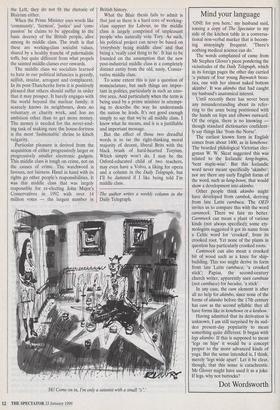Mind your language
`ONE for you here,' my husband said, tossing a copy of The Spectator to my side of the kitchen table in a conversa- tional non-verbal marker that is becom- ing annoyingly frequent. 'There's nothing medical science can do.'
The words complained of came from Mr Stephen Glover's piece pondering the vicissitudes of the Daily Telegraph, which in its foreign pages the other day carried `a picture of four young Baywatch beau- ties, one with her almost naked bottom akimbo'. It was akimbo that had caught my husband's anatomical interest.
Until recently there has never been any misunderstanding about its refer- ring to the arms being positioned with the hands on hips and elbows outward. Of the origin, there is no knowing though standard dictionaries confident- ly say things like 'from the Norse'.
The earliest known form in English comes from about 1400, as in kenebowe. The bearded philological Victorian cler- gyman W. W. Skeat suggested this was related to the Icelandic keng-boginn, `bent staple-wise'. But this Icelandic word never meant specifically `akimbo'; nor are there any early English forms of the word, such as keng-bown, that would show a development into akimbo.
Other people think akimbo might have developed from cambok, deriving from late Latin cambuca. The OED invites us to compare this with the word cammock. There we fare no better. Cammock can mean a plant of various kinds (not always specified); some ety- mologists suggested it got its name from a Celtic word for 'crooked', from its crooked root. Yet none of the plants in question has particularly crooked roots.
Cammock can also mean a crooked bit of wood such as a knee for ship- building. This too might derive its form from late Latin cambuca, 'a crooked stick'; Papias, the second-century church writer, apparently uses cambuca (not cambuca) for baculus, 'a stick'.
In any case, the cam element is after all no help for akimbo, since none of the forms of akimbo before the 17th century has cam as the second syllable: they all have forms like in kenebowe or a kenbow.
Having admitted that its derivation is unknown, I am still surprised by its sud- den present-day popularity to mean something quite different. It began with legs akimbo: If this is supposed to mean `legs on hips' it would be a concept proper to the more advanced kinds of yoga. But the sense intended is, I think, merely 'legs wide apart'. Let it be clear, though, that this sense is catachrestic. Mr Glover might have used it as a joke. If legs, why not buttocks?
Dot. Wordsworth


























































 Previous page
Previous page